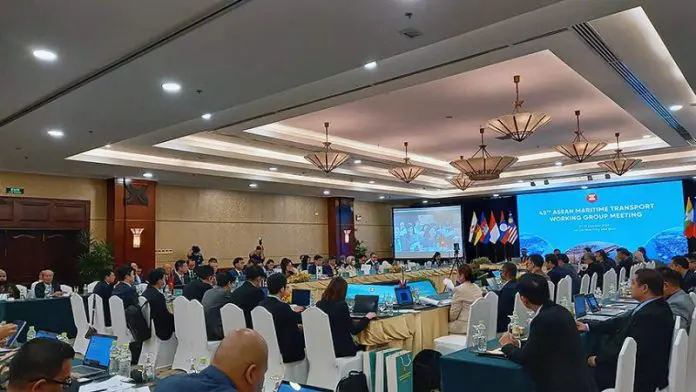The Philippine delegation to the 45th ASEAN Maritime Transport Working Group Meeting held recently in Vietnam presented to the delegations the country’s efforts toward green shipping and decarbonization as part of its commitment towards building efficient and sustainable shipping in the ASEAN.
Maritime Industry Authority (MARINA) deputy administrator for Planning, Sonia Malaluan, who heads the Philippine delegation, presented the Philippines’ National Strategy and Action Plan that was drafted despite challenges in the implementation of the decarbonization strategy and targets. The plan was drafted after adoption of the International Maritime Organization (IMO) Revised Strategy on the Reduction of GHG Emission from Ships.
In a statement, Malaluan described the Policy Menus under the ASEAN Green Ship Strategy as “comprehensive, addressing challenges of most of the ASEAN member states,” and further expressed the country’s interest in technical assistance and data, and how the roadmap for decarbonization was developed.
The Philippines also showed its efforts in the development and implementation of fuel economy policies and standards, including those involving the development of cleaner fuels and vehicles and vessels.
The Department of Energy (DOE), for its part, said it is aggressively implementing the Energy Efficiency and Conservation Act (Republic Act 11285) and the Electric Vehicle Industry Development Act (Republic Act 11697).
Under the Philippine Energy Plan 2020-2040, the DOE revealed that hydrogen is being considered for use in power generation and in the maritime transport sector.
Likewise, the agency is looking into possible increase in the capacity of Liquefied Natural Gas (LNG) facilities in the country to accommodate maritime transport, with LNG seen as a transition maritime fuel.
The Philippines also shared updates on the Port and Ballast Water Baselines using Ecological, Microbiological, and eDNA Approaches (PORTEC) Project, which include capacity-building activities on port baselining and microbiology hands-on-training conducted with the maritime sector.
Further, the project has completed two-year water sampling on the Port of Manila, with about 80 percent of collected samples successfully identified, with the remaining 20 percent submitted for DNA barcoding, according to the statement.
Meanwhile, the Philippines reported updates on the capacity improvement of the ASEAN network ports, coordination efforts to support the sustainability of the Davao–General Santos–Bitung roll on-roll off route, efforts on Safety, Health, and Environmental management in Philippine ports, and IMO-related efforts and activities.
The Philippine delegation is composed of representatives from the Department of Transportation, MARINA, Philippine Coast Guard and Philippine Ports Authority.
(PHOTO CREDIT: MARINA)

